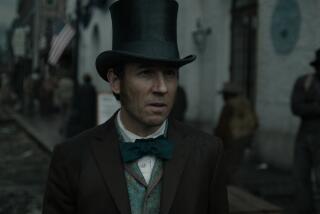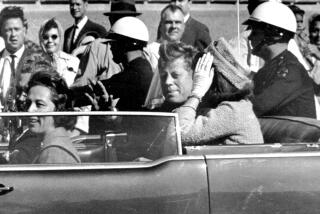New Historic Insights Into Lincoln, a Man of Tragedy
- Share via
All his life he was surrounded by death and in his last years probably was critically ill himself. Yet he achieved greatness and always bounced back from his fits of depression, often using a humorous story to alleviate the gloom that swept over him from personal and national sorrow.
That’s the way Andrew F. Rolle, Cleland professor of history at Occidental College, would like Abraham Lincoln to be recalled today, the 177th anniversary of the 16th President’s birth.
Rolle, who has four years of psychiatric training, is a specialist in the use of psychiatric techniques in biography and history, a field generally labeled psychohistory. He also is the co-author with historian Allan Nevins and novelist Irving Stone of a book about Lincoln, “Lincoln, A Contemporary Portrait.”
In Rolle’s view, Lincoln has become in the late 20th Century almost a neglected figure in American history, even though he is one of our few legitimate “superstars” who can share the world historical stage with the likes of Winston Churchill, Albert Schweitzer and Mohandas Gandhi.
“The first 100 years after his death he was sanctified, but now you don’t hear much about him,” Rolle, a specialist in the Civil War era, said in an interview. Presidents John F. Kennedy and Franklin D. Roosevelt, “the two great modern figures of political life, put him (Lincoln) in the shade, and to some extent Harry Truman did too and maybe even Reagan, whose popularity is immense.”
‘Constant Updating of Death’
Lincoln’s achievements are even more impressive if the Illinois lawyer’s personal tragedies--”a constant updating of death”--are taken into account, Rolle said. When Lincoln was 3 his baby brother died of unknown causes; at age 9 he lost his mother, at 18 his sister and at about the same time Anne Rutledge, widely thought to have been the love of his life. In addition, Lincoln’s wife, Mary Todd Lincoln, was chronically depressed and two of their children were claimed by death.
Following the death of Rutledge, Lincoln was “really out of it for some weeks and his contemporaries were very worried about him,” Rolle said. “There was even fear that he might take his life.”
In the White House, Lincoln was further affected by the slaughter of the Civil War, Rolle said. Following the report of one especially bloody battle, Lincoln was overcome by a “nervous excitement bordering on insanity,” according to an eyewitness account. But even in this moment of near-collapse, Lincoln was able to draw on inner resources and brought himself back from the brink with a frontier story about two brothers chasing an escaped pig.
Swine by the Tail
The pig, it seems, drove one boy up a tree and the other boy, to avoid the animal’s tusks, grabbed the swine by the tail. After the pig had circled the tree a number of times, the boy holding the tail called to his brother, “ ‘John, come down and help me let this hog go,’ ” Rolle related. Lincoln capped the story by saying, “ ‘I wish someone would come down and help me let this hog (the Civil War) go,’ ” he noted.
Throughout his life Lincoln used such tales “as a form of denial . . . a natural defense of the ego, a major mechanism of defense of the ego, the ego being that part of our being that is constantly under attack,” Rolle said.
Although he thinks Lincoln would have been a good, “non-resistant” candidate for psychiatric analysis--certainly better than Churchill who called his depressions a “black dog”--Rolle emphatically said he does not believe that Lincoln had a serious mental illness.
“He didn’t take to his bed in the way Churchill did,” he said. “Churchill, sometimes for days on end, would just disappear from the scene. But Lincoln kept going. He was not afraid to speak of his maladies and he even told his Cabinet of his dreams. . . . Lincoln has a compassionate quality. He was a listener, he was a learner and he really, I think, wanted to understand himself as best he could.”
If he had not been assassinated by John Wilkes Booth in 1865, Lincoln “probably would have continued to cope. He was certainly not a psychotic. He may not have even been a neurotic,” Rolle said.
Lincoln’s later years were complicated by the fact that he may have been suffering from Marfan syndrome, a hereditary disease that produces a lengthening of the skeleton--characterized by Lincoln’s 6-foot, 4-inch height, his long, gaunt face and his large hands and feet--and heart disease.
Shortly before his death, Lincoln wrote, “I am very unwell now. My hands and feet seem to be always cold and I ought perhaps to be in bed,” Rolle quoted, noting that cold hands and feet, caused by an insufficiency of blood, are often symptoms of heart disease. Rolle added that Lincoln probably would not have survived many years even if he had not been shot.
In Favor of Theory
The Marfan theory was postulated by Dr. Harold Schwartz, among others, several years ago, but despite strong evidence in the theory’s favor, many historians continue to resist the premise, Rolle said.
Yet to Rolle, the evidence of both Marfan’s syndrome and depression are convincing. More importantly, these handicaps make Lincoln a more complicated and interesting figure than the two-dimensional figure adorning cents and $5 bills, he said.
“I think he had a sense of leadership that was not built on the normal desire of the politician for power or for deference,” Rolle said. “Some politicians, like Lyndon Johnson, crave deference and they go into public office partly because this is what they want. I think partly in Lincoln’s case, it was a sense of enlightened destiny almost, as though he had to do it.”
Indeed, the “richness of Lincoln’s character” is such that even today Lincoln might make it to the White House, Rolle said. “My guess is that if he’d grown up in this age, he would have been a different Lincoln and he would have adapted himself in a different way. . . . But he certainly had resources that were deep and powerful, which is more than you can say for a lot of modern leaders who make it to the top. If Jimmy Carter could make it, I can’t imagine Lincoln not.”
Rolle is aware that his embrace of psychohistory makes him somewhat controversial within the scholarly community.
“Historians are resistant to this kind of thing. Not all historians would go along with this kind of approach,” he said. “. . . On the other hand, most historians have not received even one hour’s training in psychiatry, so who are they to make a judgment?”
By dealing with historical figures in this way, it may be possible to learn a little about what they were actually like, rather than lifelessly enshrining them in monuments, Rolle said.
Although there is the potential for using psychohistory merely as a different way of labeling great men, it can present them as they really were, Rolle said. Quoting a contemporary account, he added that Lincoln was “one on whom sorrow and care had done their worst without victory.”
More to Read
Sign up for our Book Club newsletter
Get the latest news, events and more from the Los Angeles Times Book Club, and help us get L.A. reading and talking.
You may occasionally receive promotional content from the Los Angeles Times.









